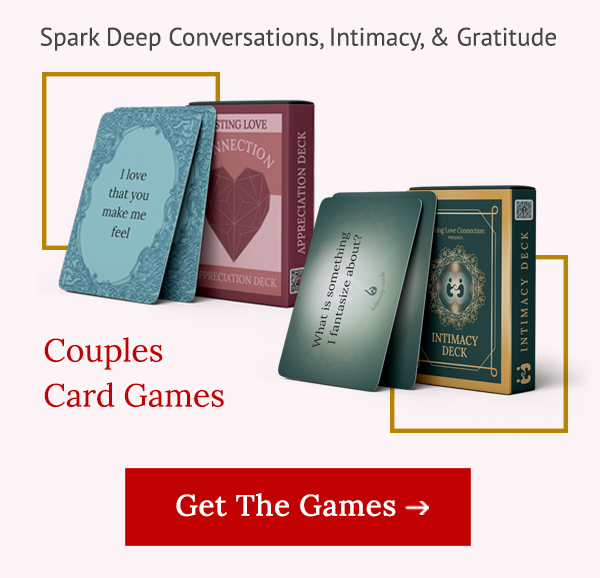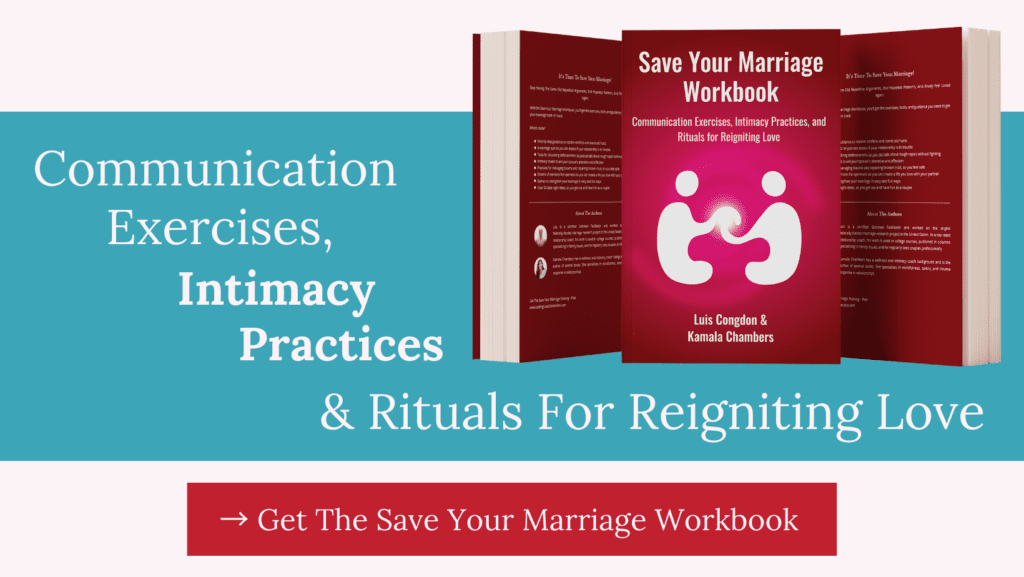Want to learn how to end relationship arguments?
Although most want to push relationship problems aside, we can’t.
Repeated issues don’t go away overnight.
First, let me tell you, if you have issues that don’t seem to go away — you’re not alone.
It’s normal for couples to have arguments that lead to fights.
On that same note, it’s common for couples to argue about the same stuff repeatedly.
As a matter of fact, research from the Gottman Institute shows that recurring problems make up 69% of all marital issues. In other words, most of the fights that couples have are about the same stuff.
Table of Contents
In on how to end relationship arguments
If you’ve had enough of those exhausting arguments, you likely feel that regardless of what you do:
Those fights won’t go away.
You’ve likely already tried every which way to end those fights.
And maybe you’ve gotten to a place where you avoid the issue altogether.
And yet…
Those arguments and fights keep happening.
It’s exhausting, taxing, frustrating, and ruins marital bliss.
Changing for your partner isn’t the best method. And expecting your partner to change isn’t either.
You need an approach to those repetitive issues that ends the relationship arguments — and ideally creates more connection.
Ending repetitive fights isn’t about agreeing to do things you don’t want to. Stopping those arguments doesn’t work if you’re trying to ‘get rid’ of the problem.
Stopping those redundant, never-ending fights is about repairing and learning a new strategy that deepens the connection.
Why Do Couples Fight About The Same Stuff Over & Over?
As a researcher and relationship expert, I’ve learned that repeated issues happen for three reasons:
- Key differences in perspectives
- Character differences that clash
- A lack of understanding and not being able to give each other understanding.
Let me give you some examples if that doesn’t make sense. As you read, see if you recognize your relationship in any of these examples. Afterward, I’ll teach you the strategy to end those pesky relationship arguments.
Example One:
One partner is clean and tidy, and the other is looser and more laid back.
Example Two:
One spouse enjoys more frequent lovemaking, while the other could take it or leave it.
And Example Three:
A partner is a spender and enjoys shopping, buying, and getting nice things for the house and family. Meanwhile, the other partner is more interested in saving, acquiring wealth in the bank, and investing.
Example Four:
One partner is adventurous and enjoys taking risks. On the other hand, the other spouse is more conservative, likes predictability, and thrives in knowing what is next.
Do you recognize yourself in any of these examples?
If none of the examples work above, you can think about any of your repeated relationship problems. The examples are just there to help you get an idea of how two people who are starkly different create an issue — and below, I’ll show you how you can take those differences and turn them into opportunities for growth, understanding, and connection.
Know Why Repeated Issues Keep Happening So You Know How To End Relationship Arguments
The number one reason couples stay stuck with any problem comes down to:
Not feeling understood.
If you look at any issue you’re having; I am sure a part of you doesn’t feel heard. I am sure you feel ignored, not prioritized, not valued, and misunderstood by your partner. Also, I know there are other feelings you likely have, but not being heard is the biggest one.
Once you and your partner resolve not feeling listened to, you will quickly fix the presenting issues. Once you have an understanding, the other smaller feelings will dissipate.
“Repeated Issues Happen Because One Or Both Partners Don’t Feel Understood.”
Reducing your differences, fighting less, or getting rid of the problem isn’t the answer.
Instead of changing the issue or even ourselves, we can reduce the arguments by introducing more understanding. We can put a stop to those exhausting fights by learning good communication in ways that signal to each other:
- I hear you.
- You matter to me.
- I understand.
- I know you’re hurting.
- You are important to me, and I care about your experience.
- I can feel what you’re saying, and it matters to me.
Once you and your partner give and receive these messages of caring and understanding — the issues you’re having will transform.
Related Article: How To Be A Better Listener In A Relationship
What used to be an issue becomes an opportunity, and what used to be a problem turns into a possibility for connection.
Contrary to what you might be thinking…
Redundant issues stay there because couples struggle to give each other understanding.
In my two-decade experience of working with over 1,000 married couples and researching marital satisfaction, I’ve learned that issues transform once understanding happens.
The shift that happens with understanding creates a new possibility of happiness, and connection, and opens a gateway to new outcomes unimagined.
Getting rid of the issue isn’t the answer, and changing who you are fundamentally isn’t the answer either.
Understanding is the answer.
Here is the new strategy for how to end relationship arguments.

Next time you find yourself in that ‘all-too-familiar’ territory of talking about that same old issue, do this:
Give your partner understanding.
To put it briefly, understanding is:
- Validation of someone’s experience.
- Empathizing with how your partner feels.
- Giving someone space to share their view
- Allowing another to think and feel differently than you
- Offering an ear to someone so they can share.
Now that we have a basis for what understanding is, let me show you how to give it (and how to get it):
Let’s start with one of the most critical steps to reducing arguments and even disarming anyone (your spouse, your kids, your boss, and anyone else).
The top three ways to give our understanding are:
(These strategies are how you end relationship arguments successfully).
- Validation & empathy
- Re-stating what you hear
- Asking open-ended questions
I know it sounds like a lot, and it can be. In the last part of this article, I’ll show you how to effectively use these three skills to end relationship arguments.
How To End Relationship Arguments With Validation & Empathy:
Most couples argue because they’re not feeling heard or understood. While the content of fights might be about money, kids, differences in sex drive, time together, or something else.
The root cause of all marital spats boils down to one or both people not feeling heard.
Giving validation and empathy look like this:
“I hear you’re upset. Based on what you feel, it makes sense you would be upset about ______.”
“I know it made you mad when I said that. I know how upsetting it is to have someone talk like that.”
Imagine you’re having an argument, and then your partner says one of the statements above (and means it).
That would be incredible, right?
The key to validation and empathy is:
Sharing you hear the person.
Communicating that you understand why your partner feels that way.
In most arguments, two people fight to get their points of view heard, but no one budges. This kind of tug-of-war is what makes disputes escalate into fights.
Validating and empathizing ends this cycle of push and pull, screaming and yelling.
“It makes sense you feel that way.”
A simple statement like that can go a long way in ending relationship arguments.
Re-stating What You Hear
What you say and what someone hears isn’t always the same.
Quite often, I find couples fighting like two lawyers litigating.
They’re at each other’s throats trying to explain themselves, and no one is listening.
Ironically, many arguments happen because someone thinks one thing is being said, but something else is being shared. By repeating what we hear, we can make sure to clear up misunderstandings before an argument begins.
Repeating what a partner has heard quite often leads to clear communication and makes couples go:
“Oh! I was so certain you were saying this, but you were saying that!”
As simple as it sounds, most couples’ arguments boil down to misperceptions. Incorrect interpretations can easily lead to misunderstanding and quickly spiral into relationship arguments.
By repeating what you’ve heard, you can clarify if what was said and what was interpreted from your partner’s words are the same. Quite often what we hear and what someone means are not the same — repeating and re-phrasing assures misunderstandings don’t lead to arguments or confusion.
How To Restate What You’ve Heard (To End Relationship Arguments)
To restate what you hear, all you have to do is repeat back, in your own words, what you’ve heard your partner say.
“Just to make sure I heard you right, let me repeat what I think you said”
(and then insert what you heard)
By repeating what we’ve heard, we can expose the difference between our listening and what our partner is saying. Repeating what you heard can end relationship arguments before they even arise.
Asking Open-Ended Questions

Once you repeat what you’ve heard, it helps to follow up with a question.
Curiosity is the weed wacker that helps clear the muck.
Much like a roadmap helps you reach your destination without issues, open-ended questions help you explore the internal. The best research in the world calls for mapping out your relationships and creating love maps.
Update your love maps. Get the Intimacy Deck.
If you want to end relationship arguments, get good at asking your partner questions. To help, let me share some examples:
“How come you want this to happen?”
“What makes this so important to you?”
“How come you felt so hurt yesterday?”
“What do you want me to understand about this issue?”
The main idea behind open-ended questions is your inquiries reach deeper. It takes more than a simple yes or no to answer the questions. Answering the questions requires your partner to reveal more about themselves.
By investigating, we can discover the root issue of an argument. Questions help create a path of clarity, which, in turn, helps end many relationship arguments.
Ask open-ended questions if you want to know how to end relationship arguments.
Just like new couples fall in love through dialogue and curiosity, committed couples can find solutions to their issues by checking in with each other and asking open-ended questions.
Through this process of inquiring about your partner, you may discover that the root of an issue is some old trauma, memory, or dream. Like a good scientist needs all the right information to assess a real problem, you need all the data to help you end a relationship argument.
Related Article For Creating Emotional Safety: Window of Tolerance Worksheet
It’s Possible To Learn How To End Relationship Arguments
Every day in my work, I see couples put old issues to rest.
The process isn’t always easy, but it’s worth the work.
By using understanding, empathy, and open-ended questions — you can put an end to relationship arguments.
When you use empathy, you can help your partner feel good and safe. As you utilize open-ended questions, you’ll discover that most of your issues are rooted in history, personal stories, and that will help you navigate your way out of the weeds.
Any couple can end a relationship argument. Sometimes it’ll require more time empathizing, asking questions, and validating. Sometimes, a straightforward strategy outlined here is all you’ll need. Whatever the case may be, I believe every couple can end relationship arguments using the methods shared in today’s article.
If you give these a shot and find you need extra support – feel free to book a complimentary couples consultation to see if couples coaching can help.







0 Comments